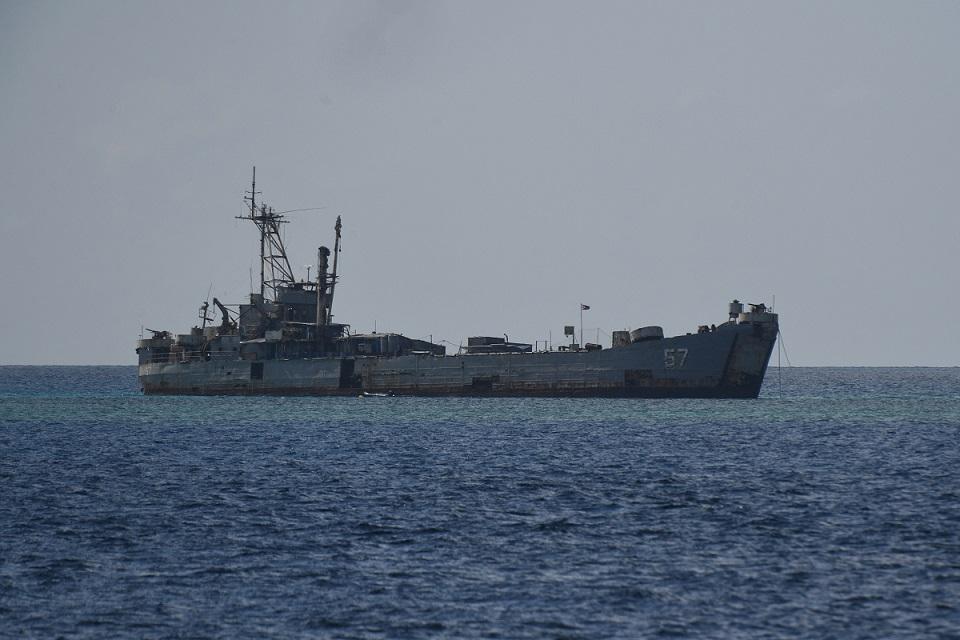PH, China Ayungin deal 'done in good faith' — DFA

The Department of Foreign Affairs on Monday said the Philippines' new arrangement with China aimed at ending hostilities at a contested shoal off the South China Sea was "done in good faith" as it belied Beijing's claim that it agreed to certain conditions long rejected by Manila.
Reacting to a statement issued Sunday night by the Chinese Foreign Ministry, the DFA said its spokesperson’s statement insisting that China would only allow Philippine resupply missions to Ayungin Shoal if there is notification and on-site confirmation is "inaccurate."
Manila occupies Ayungin.Shoal, also known by its international name Second Thomas Shoal and called Ren'ai Jiao by the Chinese, but is being claimed by China as its own.
Analysts feared that hostile incidents in Ayungin, such as the June 17 clashes between the Chinese Coast Guard and the Philippine Navy, may result to more dangerous unplanned encounters that may escalate to a full-blown conflict and involve Manila's treaty ally, the United States.
"In our desire to de-escalate the situation in the South China Sea and to manage differences in a peaceful manner, we emphasize that the agreement was done in good faith," Foreign Affairs spokesperson Teresita Daza said.
She stressed that the arrangement was concluded "with the clear understanding by both sides that it will not prejudice our respective national positions."
"For the Philippines, this means that we will continue to assert our rights and jurisdiction in our maritime zones as entitled under UNCLOS, including in Ayungin Shoal which is within the Philippines’ exclusive economic zone (EEZ) and continental shelf," Daza said.
UNCLOS stands for United Nations Convention on the Law of the Sea - regarded as the global constitution for the seas signed by162 nations, including the Philippines and China.
The Philippines"remains ready" to implement the agreement, said Daza as she urged China "to do the same."
Philippine and Chinese officials, following a series of negotiations, agreed to a crucial deal over the weekend in a bid to reduce tensions in the area and finalized aprovisional arrangement for the resupply of daily necessities and rotation missions to the BRP Sierra Madre in Ayungin Shoal.
The rusting World War II-era vessel was intentionally grounded by the Philippines at the shoal in 1998 in response to China's occupation of Philippine-claimed Mischief Reef in 1995.
Manned by a small Filipino navy contingent, Sierra Madre serves as a military outpost and a symbol of Philippine sovereignty.
China’s repeated attempts to block Philippine resupply missions and rotational troop deployment to the shoal by firing high-pressure water cannons, intentional ramming and other dangerous maneuvers have raised tensions, prompting condemnations and concern from several regional and global powers, led by the United States.
Washington has warned that it has a treaty obligation to defend the Philippines from hostile armed attacks.
Ayungin is 105.77 nautical miles from the nearest Philippine province of Palawan and constitutes part of the country’s 200-nautical mile exclusive economic zone and continental shelf as provided under UNCLOS.
Several Philippine Navy personnel were injured in Chinese Coast Guard assault, including one who lost his right thumb last June 17.
They were blocked, harassed, and attacked by Chinese personnel while bringing food and other supplies to Ayungin.
Chinese Coast Guard rammed Philippine vessels, seized firearms and rubber boats, and threatened Filipino soldiers with knives, axe and spears to prevent them from delivering supplies, firearms and other necessities to Filipino troops at the shoal.
Chinese personnel also slashed the Philippines' Rigid Hull Inflatable Boats (RHIB) and smashed its navigational screens.
It was the most violent Chinese assault on the Philippines, which triggered strong protests from Manila, with President Ferdinand Marcos Jr. calling it "deliberate and illegal."
Manila demanded China to return the Philippine vessels and firearms.
Last weekend's agreement, finalized through an exchange of diplomatic notes, was an offshoot of a crucial high-level meeting in Manila on July 2, called the Bilateral Consultation Mechanism (BCM), held two weeks after the hostilities broke between the Chinese Coast Guard and the Philippine Navy.
"The principles and approaches laid out in the agreement were reached through a series of careful and meticulous consultations between both sides that paved the way for a convergence of ideas without compromising national positions," Daza said. — RSJ, GMA Integrated News




